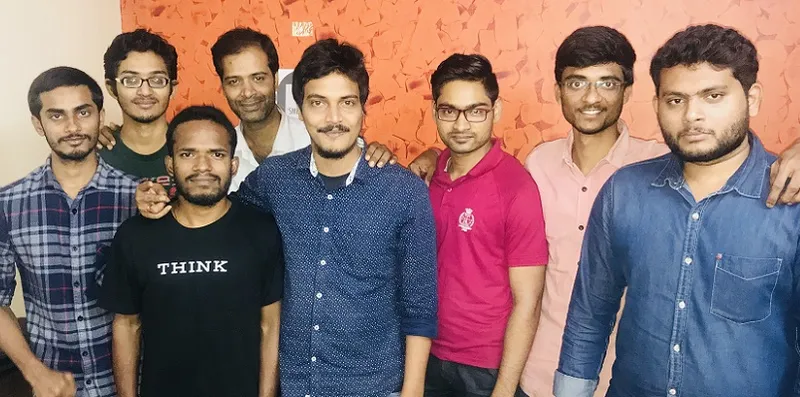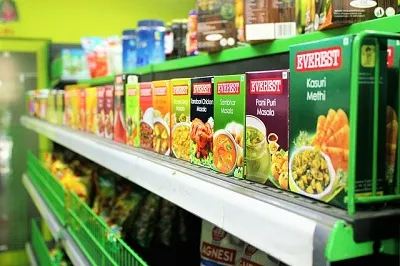Backed by AI, Smerkato aims to be a single window for grocery needs of restaurants and consumers

The word Smerkato means ‘Smart Market’. It has its origin in the Italian word ‘Mercato’, which means market. Smerkato aims to make the whole ordering/buying process for customers “smart”.
The brainchild of Tirumala Sekhar (28), Smerkato is a raw material and analytics solution provider for restaurants and food chains.
The Bengaluru-based startup, launched earlier this year, aims to organise restaurants and the QSR sector by using technology to bring visibility on wastage, usage, return on investments, etc through Artificial Intelligence (AI).
Food chains, restaurants, and hotels can place orders for all their grocery requirements directly on Smerkato and orders will be delivered to their location. Smerkato, which calls itself a ‘technology-enabled retail platform,’ is also a hyperlocal marketplace for local stores. For a fixed commission, Smerkato passes orders placed by customers directly to local stores for delivering to customers.

Smerkato is self-funded with about Rs 40 lakh invested so far. It is looking to raise Pre-Series A for $500,000-$750,000. The B2C model was launched in March and B2B model in May this year.
From one to three
Originally from Andhra Pradesh, Tirumala is a software engineer with experience in business analysis, customer fulfilment, finance, and technology. His last employment was with Tesco Hindustan Service Center where his role was to support UK operations by looking after quality, availability, deliveries, etc, for Tesco Dotcom Business.
Tirumala had wanted to start up since his formative years. But like many aspiring entrepreneurs, he wanted to gain experience in a corporate setup before venturing on his own. “After spending more than six years in corporate entities, I felt that it was the right time to make a move,” he says.
Tirumala found perfect co-founder in his cousin Guruprasad B who holds an MBA degree with more than ten years of work experience and takes care of purchase and marketing.
Tirumala claims their ambition is to not only sell groceries and vegetables, but also to change the industry as it is operating today by championing transparency of business practices and encouraging a marriage of scientific and traditional purchasing practices with traders and producers.
Smerkato comprises a team of 10. Tirumala also found mentors in Nitin Kumar of XCapital Ventures and Praveen Rane, managing partner at Rane Co and CFO - CBREX Recruiters Marketplace.
Initial strategies
Usually, restaurants and food chains that require groceries at regular intervals either hire a team to procure them from multiple sources or deal with multiple vendors directly. Both options are time and energy consuming.
As part of understanding the processes, the Smerkato team decided to collect orders from multiple customers and procure material in bulk. “This gave us a price advantage and we followed a dropship model where we procured multiple items from multiple traders and supplied them directly to our partner restaurants without holding any inventory. However, with the drop-ship model we cannot command better margins and we observed some operational challenges as well,” Tirumala recollects.
Now Smerkato is focusing on an inventory model, which allows them to procure at lower rates and gain better margins, and cater to more restaurants. Its plan is to procure items directly from manufacturers and farmers and hold them in their fulfilment centre. From there the items can be supplied to restaurants according to their scheduled order frequencies.
Learning process
Smerkato’s services included bringing transparency at management level with orders given by purchase departments of restaurants. Its initial pitches highlighted this as well as its capability to easily manage multiple vendors and be a single point supplier for all restaurant needs.
Also, as an online ordering platform, they could appraise the clients the latter’s monthly expenses, what items they have used more, and specific days the ordered basket size has increased and why.

However, there was a learning curve for the team. Tirumala recounts, “During the initial discussion with customers, we were pitching more on our product features rather than understanding their pain points. After a few interactions, we realised that we should focus more on the primary pain points and then upscale the other features in subsequent discussions. We did this for the first time with Arihant Exports and received a positive response in the very first meeting and subsequently generated our first sale.”
Standing out with tech
Smerkato’s USP lies in its tech. Tirumala claims that the app eases the manual work done by a local store.
“It not only helps them with billing but also in tracking the team’s performances and GST filings. Further, an integrated CRM Solutions for the trader and store/restaurants allows them to manage their customers better. The Smerkato application allows them to maintain just-in-time inventory,” he says, adding that based on the footfall and customer ordering behaviour, the app also estimates raw material required in the coming days.
Tirumala claims that based on customer behaviour, the app can also predict which type of dish will be in demand and thus identify the required raw material so that the order can be placed in advance. For him, the biggest success is seeing their partner restaurants finding Smerkato affordable and reliable for their raw material deliveries.

The biggest challenge, however, was reaching customers without burning too much money. “It’s difficult to maintain a big marketing/sales team without funding; but we are identifying smarter ways to reach our customers. We are using the internet to identify potential clients and sending proposals online before visiting them. We have found that sending a proposal first before meeting a client gives more positive results,” Tirumala says.
Elaborate plans
Currently, Smerkato’s transactions are on a daily, weekly, fortnightly, and monthly basis. It has 10 registered clients for B2B for grocery and raw material supplies. Also, more than 20 supermarkets have partnered (for B2C) to get their products listed on Smerkato’s website. Besides, more than 10 stores are using their billing software.
For restaurants, it has so far delivered more than 100 orders with an average basket size of Rs 22000, and for supermarkets more than 80 (organically) with an average basket size of Rs 700.
Smerkato claims to have a monthly revenue of more than Rs 4 lakh. Tirumala claims that in the last three months they have served orders worth Rs 20 lakh with a gross margin of over eight percent.
For March 2018, they are targeting a client base of more than 120 restaurants with a GMV of Rs 3.4 crore, with 120 transactions a month for restaurant supplies. It also hopes to achieve more than 150 billing software sales with a gross profit of Rs 12.24 lakh.

In Bengaluru, Smerkato wants to capture more than 100 supermarkets for order deliveries for customers who can order from its platform.
Smerkato will also be entering Tier-II cities soon, to increase sales on billing software and create a footprint for a hyper local marketplace for customers to order online. Vijayawada, Visakhapatnam, Kurnool, Mysuru, and Hubli, will be the first choices.
Smerkato is now working on integrating its entire supply chain process by using Artificial Intelligence. Tirumala claims that IBM has shown interest in helping them to develop the AI to reach their goals.
Tirumala is positive that Smerkato will be profitable in less than six months. “Our major expenses go into developing the technology and salaries for sales and tech teams. However, with the help of seed funding we can increase the number of clients, leading to increased revenues and margins. The net margins will be healthy enough for us to not only sustain our operational expenses but also to expand. We’re planning to launch our private label in sambar powder by the end of March 2018,” he says.
Smerkato’s potential competitors are WOTU, Udaan, Jumbo Grocery, and EZkirana. WOTU, funded by Kae Capital with $250K sources from YPR yard and supplies them on demand. Udaan (started by ex-Flipkart employees) is focused on local stores who look to buy raw materials in bulk, whereas Delhi-based Jumbo Grocery follows Smerkato’s model with a monthly turnover of more than Rs 1 crore.
According to advisory firm Technopak, India is the sixth-largest market for groceries in the world with shopping expected to rise from $383 billion a year and touch $1 trillion by 2020. Even if 1 percent of it is online, there is a huge opportunity for multiple players in the space. This gives Smerkato an opportunity to revolutionise the industry inside out.







